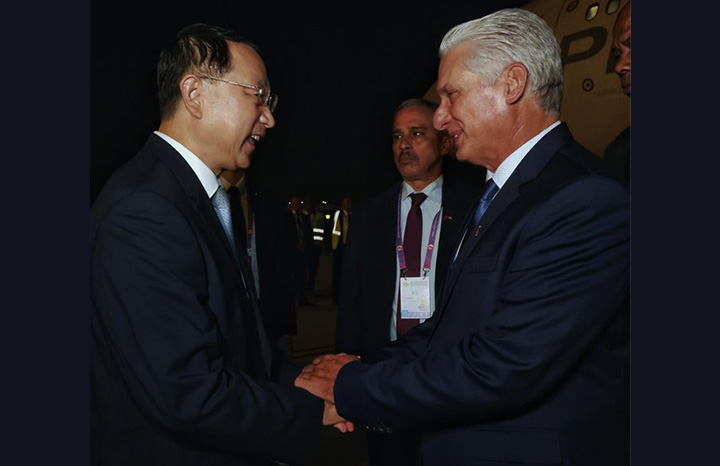Cuban President Miguel Díaz-Canel Bermúdez is in Beijing and participated in the commemorative activities for the 80th anniversary of the Victory in the Chinese People’s War of Resistance Against Japanese Aggression and the World Anti-Fascist War, where he will participate in the main ceremony and military parade on September 3.
The Head of State was received by Guan Zhiou, Minister of Natural Resources, the Cuban Ambassador to Beijing, Alberto Blanco Silva, and the Chinese Ambassador to Havana, Huan Xin. On the airport platform, the statesman received the honors appropriate to his position.
During his stay, the Cuban President will pursue an intense bilateral agenda and hold meetings with the General Secretary of the Communist Party of China and President Xi Jinping, and other high-ranking Party, state, and government officials.
The official Cuban delegation also includes Political Bureau member Bruno Rodríguez Parrilla, Minister of Foreign Affairs; Emilio Lozada García, member of the Central Committee and head of its International Relations Department; Deputy Prime Minister Eduardo Martínez Díaz; Ministers Oscar Pérez-Oliva Fraga, Minister of Foreign Trade and Investment; Vicente de la O Levy, Minister of Energy and Mines; Mayra Arevich Marín, Minister of Communications; Juana Lilia Delgado Portal, Minister-President of the Central Bank of Cuba; and Mayda Mauri Pérez, President of Biocubafarma.
The decision to establish diplomatic relations with China was announced by Commander-in-Chief Fidel Castro Ruz in the context of the First Declaration of Havana on September 2, 1960, before a million Cubans, and was made official on September 28 of that year. Never in world history had a country’s recognition process been carried out through a popular consultation.
Díaz-Canel’s visit to China will build on recent meetings with Xi Jinping, such as those held in Johannesburg at the BRICS summit in South Africa, and in Moscow last May.
During his visit, the Cuban leader expressed his deep admiration for China’s ancient history and current development, highlighting the role of the Communist Party, the government, and the Chinese people in building a prosperous and united nation. Díaz-Canel especially expressed his gratitude for China’s firm and constant support in the face of the blockade imposed on Cuba, emphasizing that this cooperation has been decisive in addressing economic and social challenges. This meeting further strengthens the strategic alliance between the two countries, based on mutual respect, solidarity, and commitment to a multipolar and just world.
This historic event, which honors the Chinese people’s resistance to fascism, brings together leaders from various nations in a gesture of respect and recognition for the shared sacrifices in defense of peace. Cuba’s presence at this ceremony reaffirms the historical and diplomatic ties that unite both nations, especially within the framework of their 65 years of bilateral relations.E
(With information from the Cuban Presidency and Granma)

